
You are logged in as
Logout
You are logged in as
LogoutThis website uses cookies to distinguish you from other users. This helps us to provide you with a good user experience and also allows us to improve our website. More information

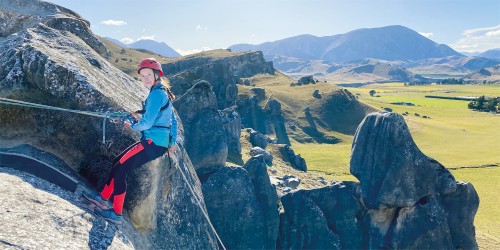 St Andrew’s College has a long history of giving students the opportunity to be challenged in an outdoor setting away from College.
St Andrew’s College has a long history of giving students the opportunity to be challenged in an outdoor setting away from College.
Each year, separate Outdoor Education experiences are organised for all Year 9–10 students. Year 9 has a five-day orientation camp, while Year 10 enjoys a four-day experience. The camps give students the opportunity to participate in a wide range of outdoor activities and team building programmes.
For further information, visit our Castle Hill and Outdoor Education page.
Career information and opportunities concerning all university and tertiary educational institutions is readily available from the Rentoul Senior College.
Individual interviews are conducted with all Year 11 students to ascertain their needs for the following year, but students at any level may make an appointment for individual assistance with careers and course planning, as well as subject selection.
For further information please contact, Careers counsellor, Mr Richard Webster, on RWB@stac.school.nz.
Mrs Shelley Broad takes the vocational students’ classes in Year 11. She helps develop the skills they will need for successful transition to tertiary education or the workplace. She also runs a ‘Transition to Work’ programme for individual students completing work experience as part of their weekly timetable.
Work exploration enables students to look at a variety of different career choices which they may be considering. By making contact with Mr Webster or Mrs Broad, they will be able to gain assistance in finding suitable workplaces for work exploration. Making decisions about careers is difficult, and work exploration is one way of finding out first-hand what it would be like to work in the industries they are considering.
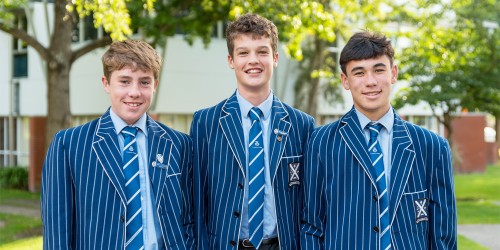 We are privileged to have such a beautiful campus. As a member of the College family it is expected that students will respect all areas of the campus, including classrooms, gardens and buildings.
We are privileged to have such a beautiful campus. As a member of the College family it is expected that students will respect all areas of the campus, including classrooms, gardens and buildings.
Students are responsible for their own property. They are advised against bringing valuables and money to College. They should ensure that clothing and other belongings are named, and lockers, are kept locked. Prevention is the best policy, as recovery of stolen items is unlikely in many cases. Students should also treat others’ property with respect and hand in anything they find to the Middle School Office.
Classroom Use and Care
Textbooks
Text books are issued free of charge at the beginning of each year and remain the property of the College. They are issued on the condition that they are maintained in good condition throughout the year.
The student is responsible for any replacement that becomes necessary through damage or loss.
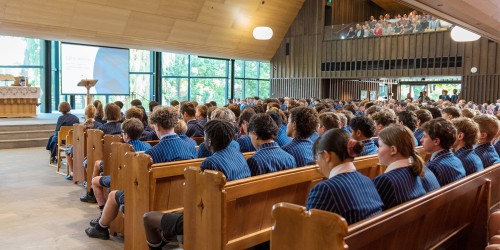 St Andrew’s College is firmly founded on Christian principles, and worship in the Chapel is a central feature of life in the College community. Our College motto, Fides et Patria (Faith and Country), presents us with a special challenge as we seek to encourage our students to know and love God, and to serve others within and beyond our College community.
St Andrew’s College is firmly founded on Christian principles, and worship in the Chapel is a central feature of life in the College community. Our College motto, Fides et Patria (Faith and Country), presents us with a special challenge as we seek to encourage our students to know and love God, and to serve others within and beyond our College community.
Compulsory mid-week chapel services are held for all year groups during school time. Sunday evening chapel takes place three times a year. Attendance is compulsory and we invite families to join students for these special services. Chapel services are marked on the term fixtures.
The services are led by the College Chaplain, Rev. Paul Morrow.
If you receive an injury to your head or impact to your body, you may have sustained a concussion. With rest and gradual return to school and sports, these usually resolve quickly.
You must report any concussion to the College Nurse or Concussion Officer as soon as possible. After an incident, it is important to visit a doctor, who will assess whether you have concussion.
During the first 48 hours, it is important to rest your brain and body. That means staying home from school, walking around the house if that does not make the pain or symptoms worse, and:
The more you rest during this time, the faster the recovery and return to normal.
Book a doctor's appointment as soon as possible, to be assessed or cleared of concussion.
If any of the following symptoms occur, inform your parent/caregiver and contact your doctor for advice. If symptoms worsen, it is important to get immediate medical care – this could indicate a more serious injury:
It is important not to ignore these symptoms, as this will delay recovery.
After 48 hours, you can begin the Gradual Return to Learn process. The College will support you through the Return to Lean process and manage your school workload and any assessments or commitments.
Your year level Dean will make a plan and communicate with school staff on your behalf. Make sure you see your doctor before returning to full sport training, particularly for contact training. Take care of your mental health during recovery; it is normal to find this recovery hard. Talk to your parents/caregivers/coaches/friends and ask for help if you need it.
To optimise navigation in digital and technological spaces, students are encouraged to familiarise themselves with our Cyber Safety information to gain awareness of potential risks and corresponding risk mitigation strategies.
Please see the links below for these resources:
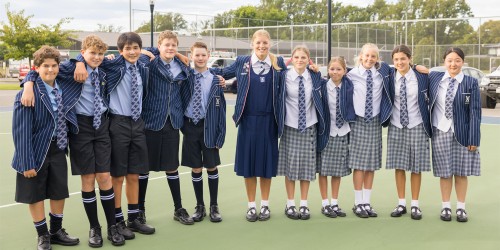 There are 28 classroom periods scheduled each week. However, the student’s commitments will vary depending on their involvement in options, Religious Education, Physical Education, Life Skills or study. Their timetable will be unique to the student. Their Dean, in conjunction with the Head of Middle School, will authorise any changes and approve it.
There are 28 classroom periods scheduled each week. However, the student’s commitments will vary depending on their involvement in options, Religious Education, Physical Education, Life Skills or study. Their timetable will be unique to the student. Their Dean, in conjunction with the Head of Middle School, will authorise any changes and approve it.
Tutor group meetings are held on Monday, Tuesday, Wednesday and Thursday (for an extended time). There is a year group meeting once a week during tutor time for each year with their Dean and Head of Middle School. A Secondary School Assembly (Years 9–13) is held twice a term, with an adjusted timetable during that teaching day. On Fridays where there is no assembly, a normal six-period teaching day will operate.
Lunch is at 12.35pm each day and the Cafeteria is available at morning interval and lunchtimes.
Examinations for Years 9–10 Middle School students take place in early November. Year 11 students sit College examinations in Term 4 and external examinations from mid-November to early December. NCEA assessment requirements are different for each subject. Individual subject teachers will make this information available to their students early in the course.
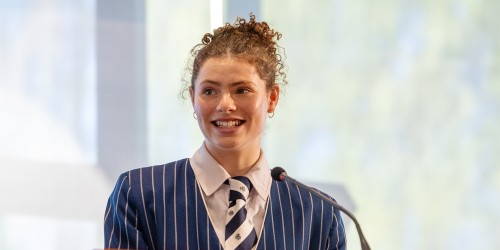 Leadership opportunities and positions of responsibility are offered to students in the Middle School. Middle School Leaders perform a variety of important leadership and service functions within the Middle School. Students must be able to work well as part of a team, relate and respond well to a wide range of other students, and be reliable, responsible and co‑operative in a leadership role.
Leadership opportunities and positions of responsibility are offered to students in the Middle School. Middle School Leaders perform a variety of important leadership and service functions within the Middle School. Students must be able to work well as part of a team, relate and respond well to a wide range of other students, and be reliable, responsible and co‑operative in a leadership role.
Middle School Leaders
Applications for these positions are available to Year 10 students at the beginning of Term 4. The year group Dean and Head of Middle School, in consultation with the Principal of Secondary School, appoint up to 30 Year 11 students to carry out duties for the Middle School the following year. These duties include organising lunchtime events for Year 9–10 students, assisting in the organisation of mufti days and Years 9–10 dances, running the Year 11 Semi-formal, doing charity and community work, reading the lesson at Middle School chapel each week, and assisting in the promotion of the College at Information Evenings and Open Days.
Year 9 and 10 Leadership Opportunities
There will be a variety of leadership opportunities throughout the year for Year 9 and 10 students. Students should speak with their tutor or Dean if they have an initiative they would like to follow through with.
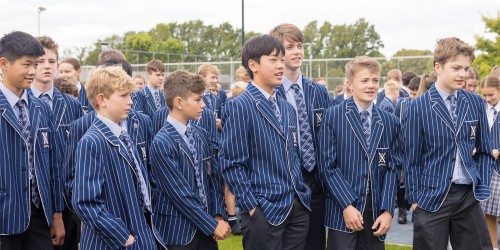 Please note:
Please note:
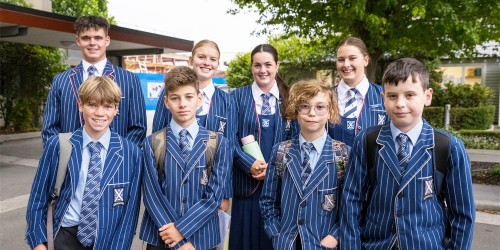 Year 12–13 students operate the Peer Support programme for Year 9 students during Orientation Week, throughout Term 1 and part of Term 2.
Year 12–13 students operate the Peer Support programme for Year 9 students during Orientation Week, throughout Term 1 and part of Term 2.
Senior students are trained to help younger students develop the skills, knowledge and confidence to get along with people around them. The result is a network of personal support for young people who are new to Secondary School.
The Peer Support programme develops communication and relationship skills. The programme is based on the understanding that people absorb information and beliefs from each other.
Other students and friends can be a positive influence on those around them, building self-esteem, strengthening relationships and decision-making.
Students are rewarded for outstanding performances at assemblies throughout the year. Formal prizegiving ceremonies occur at the end of the academic year in December. Students are rewarded for outstanding performances at assemblies throughout the year.
The whole Secondary School comes together every two weeks for assembly at 8.30am on a Friday morning. The Middle School assembly occurs twice a term.
Assemblies keep students informed and are an occasion to share in the developments and celebrate successes within the College community. Parents are invited to attend when their son or daughter is being honoured at a whole school assembly.
Purchasing Online: We use the OfficeMax My School system where stationery requirements can be ordered online. You can login at any stage during the year and purchase other items you may need. Any order over $70.00 is delivered free of charge (you can order for more than one child at a time as well).
For further information visit: www.myschool.co.nz/standrewscollege.
Purchasing Instore: Stationery requirements can also be purchased from any OfficeMax and Warehouse Stationery store. You will need to identify yourself as a St Andrew’s College family to access the special pricing.
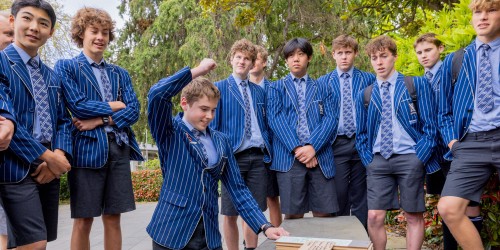 Te Waka is a unique educational, life skills programme which provides Year 10 with an overarching focus and purpose. The programme brings together strands which already exist at the College – The Rite Journey, Health Education, Duke of Edinburgh’s Hillary Award, and Outdoor Education.
Te Waka is a unique educational, life skills programme which provides Year 10 with an overarching focus and purpose. The programme brings together strands which already exist at the College – The Rite Journey, Health Education, Duke of Edinburgh’s Hillary Award, and Outdoor Education.
The backbone of Te Waka is The Rite Journey programme which reinvents the traditional process of a rite of passage to assist in transforming adolescents from dependency to responsibility. It is designed to link the hearts and minds of our Year 10 students with ‘Rites of Passage’ ceremonies, class discussion and self-reflection.
A male and a female Te Waka class is created from each core class. As each will be timetabled together, we are able to make the most of the co-educational environment and deliver the programme, based on need, either separately or together as a core class.
Each Te Waka class will have a same gender teacher and in addition to any time given to a specific challenge or activity, will meet for three periods during the week. Consequently, it is expected that a strong relationship can be built between the students and their mentor and teacher.
Throughout the year, students explore and discover consciousness, connection, communication, challenge and celebration.
Each of these is a focus:
Intention:
To graduate and receive their Te Waka badge, students will need to have participated in all aspects of the course (ceremonies and Challenge Day) and have completed a number of the following challenges from the St Andrew’s College Rite Journey Challenge Book:
The cost associated with the workbooks, ceremonies and activities is approximately $240. This will be charged to the student’s account in four disbursements of $60.00 per term.
For further information, contact Mrs Kate Taylor on KTA@stac.school.nz.
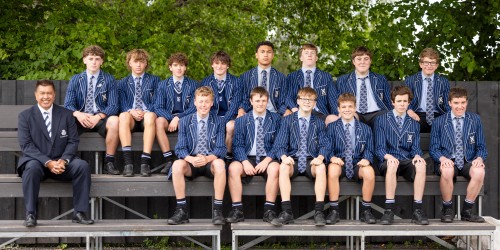 Tutors are the prime carers within the College for students in their tutor group. They take responsibility for tracking academic progress, taking an interest in co-curricular activities, implementing our well-being programme and sharing and delivering the vision for the Middle School with students. Tutors will get to know the parents and caregivers of the students in their group, and parents should take issues and concerns about their child to the tutor in the first instance. Other teachers and support staff in the College relay information and concerns about students to the tutor in the first instance. Tutors will report any academic or pastoral concerns to the Dean of the year group who may then involve the Guidance team if deemed necessary. Where possible, the same tutor will be responsible for the student’s entire time in the Secondary School.
Tutors are the prime carers within the College for students in their tutor group. They take responsibility for tracking academic progress, taking an interest in co-curricular activities, implementing our well-being programme and sharing and delivering the vision for the Middle School with students. Tutors will get to know the parents and caregivers of the students in their group, and parents should take issues and concerns about their child to the tutor in the first instance. Other teachers and support staff in the College relay information and concerns about students to the tutor in the first instance. Tutors will report any academic or pastoral concerns to the Dean of the year group who may then involve the Guidance team if deemed necessary. Where possible, the same tutor will be responsible for the student’s entire time in the Secondary School.
Features of the tutor system include:
The goals of the tutor system are:
Student needs drive this system. Students are arranged into the smallest possible groups, and programmes are developed and delivered accordingly.
The tutor groups are horizontal. In Years 9–10, the form class is divided in half. Each half will have a tutor and will be twinned with the other half for tutor support. Tutor groups are made up to maximise the natural links students have with other students, on both an academic and co-curricular level.
Below is a summarised version of our Student Social Media Guidelines. Please click here to read the guidelines in full.
St Andrew's College recognises the significance of social media in modern society, offering opportunities for students to learn, engage, and communicate. The College aims to implement guidelines to safeguard students' and the College's reputation. The guidelines cover three main sections:
Students are expected to adhere to these guidelines, with disciplinary action for any breaches.
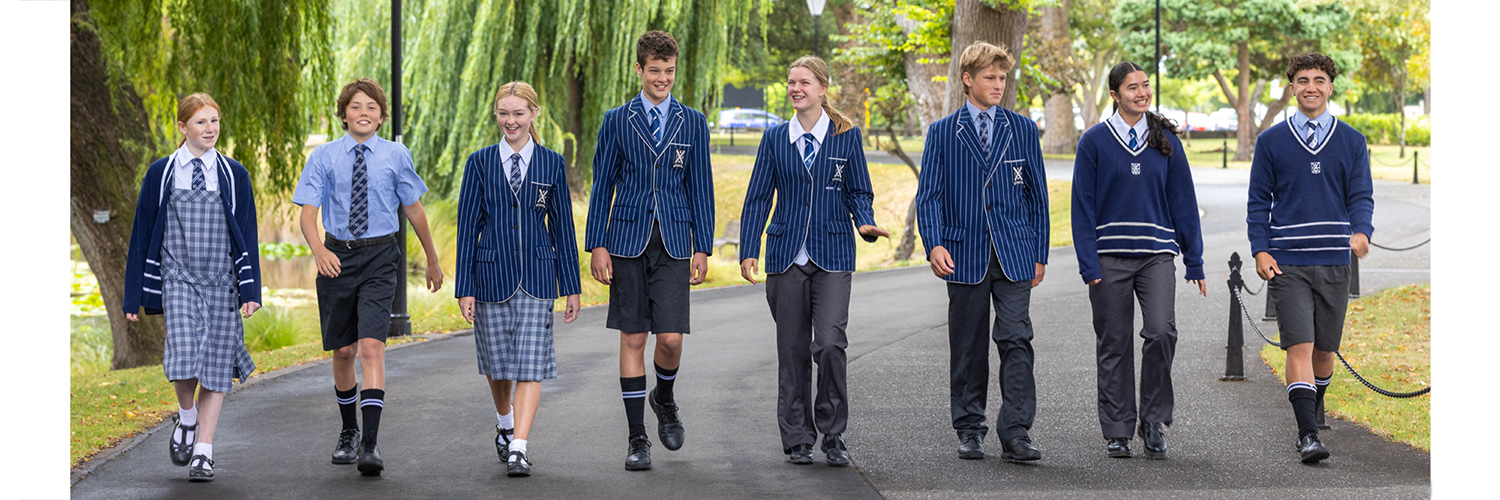
This photo showcases some of the more commonly worn uniform combinations.
We hope that all St Andrew’s College students are proud to be identified with their school and will wear their uniform correctly. The College uniform is to be worn correctly at school and when travelling to and from College.
The College uniform is worn at school and when traveling to and from the College. Students are required to:
When travelling with College teams or groups, non-uniform clothing may sometimes be approved, but only in special cases, such as field trips or Outdoor Education camps.
Only white t-shirts, singlets, or thermals under school shirts are permitted. Coloured, patterned or sports socks must not be worn.
Hair and Grooming
Hair must be clean, well-groomed, and in the natural range of colours and styles only. Hair must be kept clear off the face and above the eyebrows.
Male hair must not be longer than the length of the collar at the back, must fall above the eyebrow line, and should be of even length overall. It should be cut in a conservative style and not shorter than a number three comb. Sideburns must not be lower than the earlobe or wider than 2.5cm.
Faces must be clean-shaven.
Long hair on females must be tied back. Hair jewellery is not acceptable. Ribbons and ties must be blue or white. Scrunchies must be black, navy blue or white.
Jewellery
Only females are able to wear one pair of studs or sleepers in the lobe of the ears. Spacer earrings are not permitted. No other rings or studs of any type may be worn by any student. Wristbands, bracelets, finger jewellery, piercings and body art which are visible while wearing the College uniform are not permitted.
Make-up and Nails Guidelines
Make-up and nail varnish is not part of the College uniform, and it is not to be worn at any time with school uniform or sports uniform.
Exemptions
Exemptions to uniform or grooming based on a student’s cultural or religious identity may be approved by application to the Head of Secondary School or College Chaplain.
Breaches
Consistent uniform or grooming breaches will be communicated to the Deans, who will work with the student and the family.
A final decision on what constitutes good grooming will be made by the Head of Middle College in consultation with the Head of Secondary School and the year level Deans.
Female Fit
Male Fit
Non-gendered Items and Accessories
